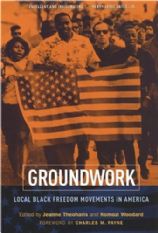Prof. Tiyi Morris Contributes to Groundwork: Local Black Freedom Movements in America
February 10, 2005
 February 10, 2005, Greencastle, Ind. - Tiyi M. Morris, assistant professor of history at DePauw University, contributes "Local Women and the Civil Rights Movement in Mississippi: Re-visioning Womanpower Unlimited" to Groundwork: Local Black Freedom Movements in America. The book is a collection of essays on the civil rights movement published by New York University Press.
February 10, 2005, Greencastle, Ind. - Tiyi M. Morris, assistant professor of history at DePauw University, contributes "Local Women and the Civil Rights Movement in Mississippi: Re-visioning Womanpower Unlimited" to Groundwork: Local Black Freedom Movements in America. The book is a collection of essays on the civil rights movement published by New York University Press.
"Although a national movement that engendered the passage of legislation to help blacks attain full citizenship rights, the civil rights movement is perhaps best understood as an assemblage of many small communities of activism that often emerged to address issues of local importance," Dr. Morris writes. "Womanpower Unlimited, founded by Claire Collins Harvey on May 29, 1961, in Jackson, Mississippi, was one such community. Organized initially to provide aid to the Freedom Riders, who were unjustly arrested, convicted and tortured in the Mississippi jails, Womanpower Unlimited expanded its activism to include such programs as voter registration drives, youth education, and peace activism."
The professor later asserts, "These women were able, long-term organizers in their community and represent the tradition of black women's activism that has been a source of strength and leadership in the struggle for black liberation as well as a vital force for social change. Through their efforts they not only sustained a movement for social justice but a legacy of activism as well."
Morris concludes, "Although they remain invisible, to some degree, in the chronicles of history, the civil rights struggle in Mississippi owes much to the foresight and action of Womanpower Unlimited... The story of these local communities shows us that this freedom movement was not entirely about a national agenda of civil rights legislation or outside activists and well-known organizations fighting on the behalf of local people; rather, it was about how local people mobilized and organized to advance the civil rights movement."
Professor Morris thanks John Dittmer, senior professor of history and professor emeritus of history at DePauw, for his "insights and suggestions" in the notes accompanying her essay.
Learn more about Groundwork: Local Black Freedom Movements in America by clicking here.
Back